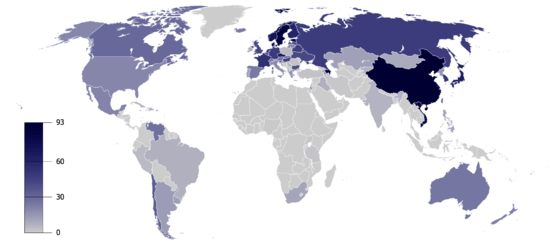Agnostic atheism

| Part of a series on |
| Atheism |
|---|
|
Arguments for atheism |
|
Agnostic atheism, also called atheistic agnosticism, is a philosophical position that encompasses both atheism and agnosticism.
Agnostic atheists are atheistic because they do not hold a belief in the existence of any deity and agnostic because they claim that the existence of a deity is either unknowable in principle or currently unknown in fact.
The agnostic atheist may be contrasted with the agnostic theist, who believes that one or more deities exist but claims that the existence or nonexistence of such is unknown or cannot be known.[1][2][3]
History

One of the earliest definitions of agnostic atheism is that of Robert Flint, in his Croall Lecture of 1887–1888 (published in 1903 under the title Agnosticism).
The atheist may however be, and not unfrequently is, an agnostic. There is an agnostic atheism or atheistic agnosticism, and the combination of atheism with agnosticism which may be so named is not an uncommon one.[4]
If a man has failed to find any good reason for believing that there is a God, it is perfectly natural and rational that he should not believe that there is a God; and if so, he is an atheist... if he goes farther, and, after an investigation into the nature and reach of human knowledge, ending in the conclusion that the existence of God is incapable of proof, cease to believe in it on the ground that he cannot know it to be true, he is an agnostic and also an atheist – an agnostic-atheist – an atheist because an agnostic... while, then, it is erroneous to identify agnosticism and atheism, it is equally erroneous so to separate them as if the one were exclusive of the other...[4]
Epistemological arguments
Epistemological, or agnostic, atheism argues that people cannot know a God or determine the existence of a God. The foundation of epistemological atheism is agnosticism, which takes a variety of forms. In the philosophy of immanence, divinity is inseparable from the world itself, including a person's mind, and each person's consciousness is locked in the subject. According to this form of agnosticism, this limitation in perspective prevents any objective inference from belief in a god to assertions of its existence.
The rationalistic agnosticism of Kant and the Enlightenment only accepts knowledge deduced with human rationality; this form of atheism holds that gods are not discernible as a matter of principle, and therefore cannot be known to exist. Skepticism, based on the ideas of Hume, asserts that certainty about anything is impossible, so one can never know for sure whether or not a god exists. Hume, however, held that such unobservable metaphysical concepts should be rejected as "sophistry and illusion". The allocation of agnosticism to atheism is disputed; it can also be regarded as an independent, basic worldview.
Other arguments for atheism that can be classified as epistemological or ontological, including logical positivism and ignosticism, assert the meaninglessness or unintelligibility of basic terms such as "God" and statements such as "God is all-powerful." Theological noncognitivism holds that the statement "God exists" does not express a proposition, but is nonsensical or cognitively meaningless. It has been argued both ways as to whether such individuals can be classified into some form of atheism or agnosticism. Philosophers A. J. Ayer and Theodore M. Drange reject both categories, stating that both camps accept "God exists" as a proposition; they instead place noncognitivism in its own category.[5][6]
Criticism
Those such as William Lane Craig who define atheism as the denial of the existence of a god say agnosticism and atheism are incompatible.
References
- ↑ Harrison, Alexander James (1894). The Ascent of Faith: or, the Grounds of Certainty in Science and Religion. London: Hodder and Stroughton. p. 21. OCLC 7234849. OL 21834002M.
Let Agnostic Theism stand for that kind of Agnosticism which admits a Divine existence; Agnostic Atheism for that kind of Agnosticism which thinks it does not.
- ↑ Smith, George H (1979). Atheism: The Case Against God. pp. 10–11.
Properly considered, agnosticism is not a third alternative to theism and atheism because it is concerned with a different aspect of religious belief. Theism and atheism refer to the presence or absence of belief in a god; agnosticism refers to the impossibility of knowledge with regard to a god or supernatural being. The term "agnostic" does not, in itself, indicate whether or not one believes in a god. Agnosticism can be either theistic or atheistic.
- ↑ Barker, Dan (2008). Godless: How an Evangelical Preacher Became One of America's Leading Atheists. New York: Ulysses Press. p. 96. ISBN 9781569756775. OL 24313839M.
People are invariably surprised to hear me say I am both an atheist and an agnostic, as if this somehow weakens my certainty. I usually reply with a question like, “Well, are you a Republican or an American?” The two words serve different concepts and are not mutually exclusive. Agnosticism addresses knowledge; atheism addresses belief. The agnostic says, “I don't have a knowledge that God exists.” The atheist says, “I don't have a belief that God exists.” You can say both things at the same time. Some agnostics are atheistic and some are theistic.
- 1 2 Flint, Robert (1903). Agnosticism: The Croall Lecture for 1887–88. William Blackwood and Sons. pp. 49–51. OL 7193167M.
- ↑ Drange, Theodore M. (1998). "Atheism, Agnosticism, Noncognitivism". Internet Infidels, Secular Web Library. Retrieved 2007-APR-07.
- ↑ Ayer, A. J. (1946). Language, Truth and Logic. Dover. pp. 115–116. In a footnote, Ayer attributes this view to "Professor H. H. Price".
Further reading
- Howe, Frederic R. Challenge and Response. Grand Rapids: The Zondervan Corporation, 1982. ISBN 0-310-45070-5
- Martin, Michael. Theism. MSN Encarta, 2000. Microsoft Corporation.
- Martin, Michael. Atheism: A Philosophical Justification. Philadelphia: Temple UP, 1992. ISBN 0-87722-943-0
- Smith, George H. Atheism: The Case Against God. 1st ed. Amherst: Prometheus Books, 1980. ISBN 0-87975-124-X
- Stein, Gordon. The Encyclopedia of Unbelief. Amherst: Prometheus Books, 1985. ISBN 0-87975-307-2
- Agnosticism. Forgotten Books. pp. 164–. ISBN 978-1-4400-6878-2.
- Richard Dawkins, "The poverty of agnosticism", in The God Delusion, Black Swan, 2007 (ISBN 978-0-552-77429-1).
- Robin Le Poidevin (October 28, 2010). Agnosticism: A Very Short Introduction. OUP Oxford. ISBN 978-0-19-957526-8.
- Thomas H. Huxley (February 4, 2013). Man's Place in Nature. Courier Dover Publications. pp. 1–. ISBN 978-0-486-15134-2.
- David Hume (1779). Dialogues Concerning Natural Religion. pp. 1–.
- Immanuel Kant (May 28, 2013). The Critique of Pure Reason. Loki's Publishing. ISBN 978-0-615-82576-2.
- Sören Kierkegaard. Philosophical Fragments. Religion-online.org. ISBN 978-0-691-02036-5. Archived from the original on February 9, 2014. Retrieved February 9, 2014.
- George H. Smith. Atheism – The Case Against God. ISBN 0-87975-124-X. Archived from the original (PDF) on February 9, 2014. Retrieved February 9, 2014.
- Berman, David (1990). A History of Atheism in Britain: From Hobbes to Russell. London: Routledge. ISBN 0-415-04727-7.
- Bradlaugh, Charles, Annie Besant and others. (1884) The Atheistic Platform: 12 Lectures. London: Freethought Publishing.
- Buckley, M. J. (1990). At the Origins of Modern Atheism. New Haven, CT: Yale University Press. ISBN 0-300-04897-1.
- Bullivant, Stephen; Michael Ruse, eds. (2013). The Oxford Handbook of Atheism. Oxford UP.
- Flew, Antony (2005). God and Philosophy. Prometheus Books. ISBN 1-59102-330-0.
- Tom Flynn, ed. (2007). The New Encyclopedia of Unbelief. Buffalo, NY: Prometheus Books. ISBN 1-59102-391-2.
- Gaskin, J.C.A., ed. (1989). Varieties of Unbelief: From Epicurus to Sartre. •New York: Macmillan. ISBN 0-02-340681-X.
- Germani, Alan (15 September 2008). "The Mystical Ethics of the New Atheists". The Objective Standard. Glen Allen Press. 3 (3). Archived from the original on 2011-04-28. Retrieved 2011-04-09.
- Harbour, Daniel (2003). An Intelligent Person's Guide to Atheism. London: Duckworth. ISBN 0-7156-3229-9.
- Harris, Sam (2 October 2007). "The Problem with Atheism". The Washington Post. Archived from the original on 2011-05-24. Retrieved 2011-04-09.
- Howson, Colin (2011). Objecting to God. Cambridge: Cambridge University Press. ISBN 978-0-521-18665-0
- Jacoby, Susan (2004). Freethinkers: A History of American Secularism. Metropolitan Books. ISBN 978-0-8050-7442-0.
- Krueger, D. E. (1998). What is Atheism?: A Short Introduction. New York: Prometheus. ISBN 1-57392-214-5.
- Ledrew, S. (2012). "The evolution of atheism: Scientific and humanistic approaches". History of the Human Sciences. 25 (3): 70. doi:10.1177/0952695112441301.
- Le Poidevin, R. (1996). Arguing for Atheism: An Introduction to the Philosophy of Religion. London: Routledge. ISBN 0-415-09338-4.
- Mackie, J. L. (1982). The Miracle of Theism: Arguments For and Against the Existence of God. Oxford: Oxford University Press. ISBN 0-19-824682-X.
- Maritain, Jacques (1952). The Range of Reason. London: Geoffrey Bles. Retrieved 2013-04-15.
- Martin, Michael (1990). Atheism: A Philosophical Justification. Philadelphia: Temple University Press. ISBN 0-87722-943-0. Archived from the original on 2011-05-19. Retrieved 2011-04-09.
- Michael Martin; Ricki Monnier, eds. (2003). The Impossibility of God. Buffalo, NY: Prometheus Books. ISBN 1-59102-120-0.
- Michael Martin; Ricki Monnier, eds. (2006). The Improbability of God. Buffalo, NY: Prometheus Books. ISBN 1-59102-381-5.
- McTaggart, John; McTaggart, Ellis (1930) [1906]. Some Dogmas of Religion (New ed.). London: Edward Arnold & Co. ISBN 0-548-14955-0.
- Nielsen, Kai (1985). Philosophy and Atheism. New York: Prometheus. ISBN 0-87975-289-0.
- Nielsen, Kai (2001). Naturalism and Religion. New York: Prometheus. ISBN 1-57392-853-4.
- Onfray, Michel (2007). Atheist Manifesto. New York: Arcade Publishing. ISBN 978-1-55970-820-3. Archived from the original on 2011-05-19. Retrieved 2011-04-09.
- Oppy, Graham (2006). Arguing about Gods. Cambridge University Press. ISBN 0-521-86386-4. Archived from the original on 2011-05-19. Retrieved 2011-04-09.
- Rafford, R. L. (1987). "Atheophobia—an introduction". Religious Humanism. 21 (1): 32–37.
- Robinson, Richard (1964). An Atheist's Values. Oxford: Clarendon Press. ISBN 0-19-824191-7. Archived from the original on 2011-04-25. Retrieved 2011-04-09.
- Rosenberg, Alex (2011). The Atheist's Guide to Reality: Enjoying Life Without Illusions. New York: W. W. Norton & Co. ISBN 978-0-393-08023-0
- Russell, Paul (11 February 2013). "Hume on Religion". In Edward N. Zalta. Stanford Encyclopedia of Philosophy (2013 ed.). Metaphysics Research Lab. Retrieved 2013-11-24.
- Sharpe, R.A. (1997). The Moral Case Against Religious Belief. London: SCM Press. ISBN 0-334-02680-6.
- Thrower, James (1971). A Short History of Western Atheism. London: Pemberton. ISBN 0-301-71101-1.
- Walters, Kerry (2010). Atheism: A Guide for the Perplexed. New York: Continuum. ISBN 978-0-8264-2493-8
- Zuckerman, Phil (2010). Society without God: What the Least Religious Nations Can Tell Us About Contentment. NYU Press. ISBN 0-8147-9723-7.
- Zuckerman, Phil, ed. (2010). Atheism and secularity. Santa Barbara, Calif. [u.a.]: Praeger. ISBN 978-0-313-35183-9.